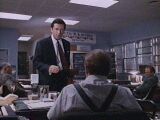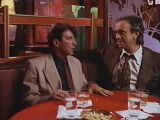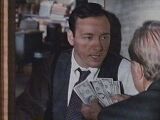Glengary Glen Ross
1992 US
Dir: James Foley
Str: Al Pacino, Jack Lemmon, Alan Arkin, Ed Harris



This movie is engrossing by the performances of famous actors.
This rather dreary movie is nevertheless engrossing. The performances of all
the players who are acting a real estate salesman are surprisingly superb. As the most scenes of this movie take
place in only two locations; i.e. inside a real estate office and a bar next to the office, overall atmosphere
is as if watching a theatrical play.
The four salesmen in the office must compete to each other.
Because two of them shall be fired. But the only person who can
adjust himself to the situation is Al Pacino. So what do you
think
the others do?
In this office located upon in suburb, which obiously suggests that they are,
after all, not elite salesmen, four salesmen are working, and, one day, they are suddenly put into such a situation
in which two of them who haven't been able to gain proceeds more than the other two in a certain duration shall
be fired. In other words, they must compete with each other fiercely. In such a circumstance, their only recourse
for acquiring customers is very fishy one, if not completely illegal, like "you have been chosen by a computer
among a vast number of applicants" or something like that. Probably they must have been employing such tactics
year after year so much so that even they, themselves, are unaware of actually doing so. But suddenly the time
comes when they must change their routine tactics. Because they have to outsmart at least other two members of
the office, and it becomes mandatory to seek out another tactics for their own survival. For this matter, only
rather younger salesman (played by Al Pacino) seems to be adjustable to the situation, for he has versatility and
an ability to improvise anything in compliance with varying situations. As for other three salesmen, they don't
seem to have such flexibility. So they act rather stiffly by stealing the leads from the office.
What is depicted here is just about power play. No moral issues
here.
Rather oddly, despite the fact that the film is solely depicting darker side
of modern business scene, I never feel any enervating effect from this movie. I guess the reason for it is because
the movie's intention resides in showing the power play, or quantity, so never quality. Essentially those four
salesmen are lone wolves, even if working in the same office together. How much money they can make is strictly
the question of quantity. Furthermore, this movie never refers to moral aspects usually accompanying this type
of issues. There are no more implications beyond the statement like if someone steals someone else's property and
get caught, he shall be punished. No mentioning about moral obligation. Just power struggles and tactics. In a
scene, Al Pacino says to one of his customers, "Bad people go to hell? I don't think so.","You cheat
on your wife? So be it." By saying so, he is never claiming that there is no moral aspect about it, but just
announcing that he is going to suspend it. Whether such an attitude is appropriate or not, these statements well
reflect the film's overall tinge that is all the more intensified by the fierce performances of the four salesmen
plus two other management staffs (played by Kevin Spacy and Alec Boldwin). In short, since moral issues are precluded
from the story, it never staggers in any point even where usual movies of this type are apt to do so by some moral
reasons, and therefore audiences can enjoy pure intensity without any hindrance of moral aspects.
This movie's Japanese title is totally absurd. The Japanese supplier
shouldn't have given such a misguiding title to any movie even
for
marketting sakes.
By the way, I would like to mention the Japanese silly title of this movie,
the reason of which is because I would like to let all people know how inconsiderate Japanese movie suppliers are.
Since I am usually watching imported video tapes, I don't care about Japanese titles. But, in this movie's case,
Japanese title is too terrible to skip mentioning. The direct translation back to the equivalent English words
from the Japanese title is approximately "dreaming of skyscraper", probably meaning "dreaming of
working in the office located upon in a skyscraper (=downtown)". I guess why the Japanese movie supplier gave
such an awkward title to the movie is probably because there is a movie titled The Secret of My Success (played
by Michael J. Fox) that has a similar Japanese title. And Michael J. Fox is one of such actors who are inexplicably
popular in Japan (I guess since he is far shorter even compared to average Japanese male persons, he might have
fitted to Japanese taste.). Anyway no one in the film seems to dream of working in the office in downtown, for
they are just preoccupied with ordinary reality and seem to have no time to dream of anything else. Even if they
do so, that is completely irrelevant to the contents of the movie. Although original English title might not be
suitable for a Japanese title, they should not have given such a misguiding title to any movie even for marketting
sakes.





